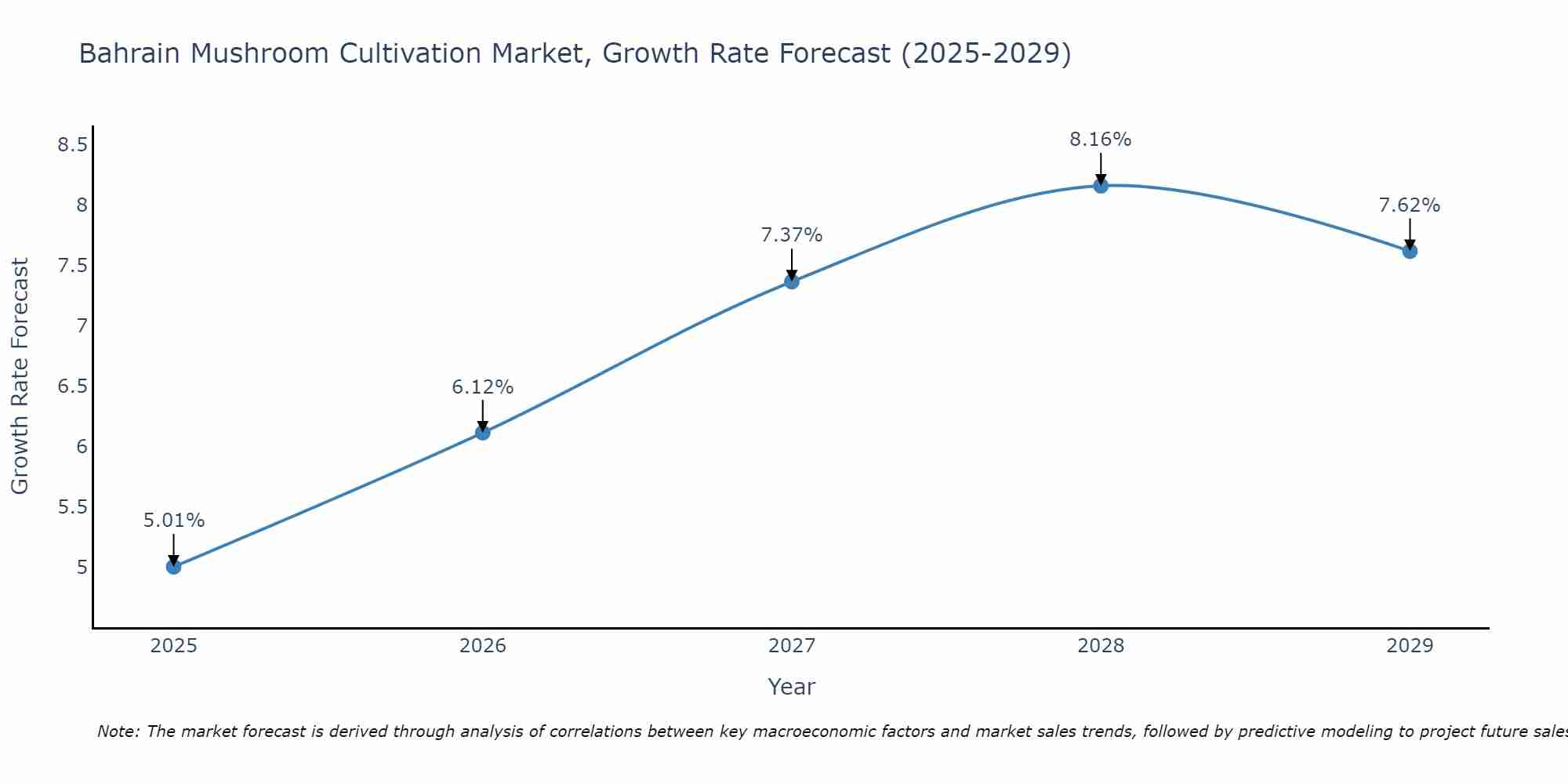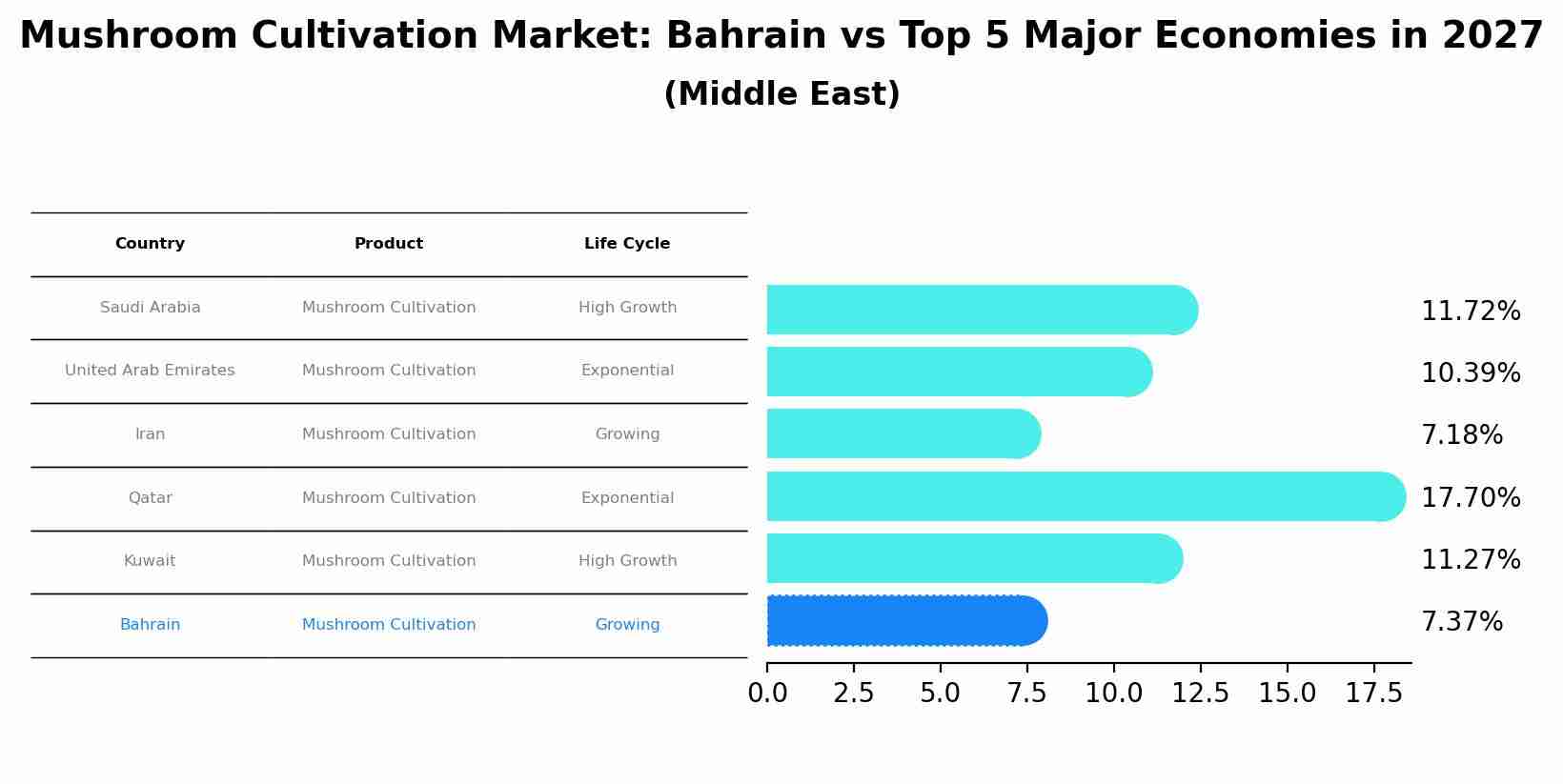Bahrain Mushroom Cultivation Market Outlook | Value, Share, Growth, Forecast, Revenue, Companies, Industry, Analysis, Trends, COVID-19 IMPACT & Size
| Product Code: ETC383144 | Publication Date: Aug 2022 | Updated Date: Apr 2025 | Product Type: Market Research Report | |
| Publisher: 6Wresearch | Author: Shubham Padhi | No. of Pages: 75 | No. of Figures: 35 | No. of Tables: 20 |
Bahrain Mushroom Cultivation Market Size Growth Rate
The Bahrain Mushroom Cultivation Market is projected to witness mixed growth rate patterns during 2025 to 2029. Growth accelerates to 8.16% in 2028, following an initial rate of 5.01%, before easing to 7.62% at the end of the period.

Mushroom Cultivation Market: Bahrain vs Top 5 Major Economies in 2027 (Middle East)
The Mushroom Cultivation market in Bahrain is projected to grow at a growing growth rate of 7.37% by 2027, within the Middle East region led by Saudi Arabia, along with other countries like United Arab Emirates, Iran, Qatar and Kuwait, collectively shaping a dynamic and evolving market environment driven by innovation and increasing adoption of emerging technologies.

Bahrain Mushroom Cultivation Market
The Bahrain Mushroom Cultivation market is witnessing significant growth driven by the increasing consumer demand for nutritious and exotic food options and the rising popularity of plant-based diets. Mushrooms are rich in protein, vitamins, and minerals, making them a valuable addition to culinary dishes and dietary supplements. In Bahrain diverse food culture, mushrooms find favor among health-conscious consumers seeking alternative protein sources and unique flavors. Moreover, advancements in cultivation techniques, such as controlled environment agriculture and organic farming practices, are enabling year-round production of high-quality mushrooms, further fueling market growth and expanding the availability of locally grown varieties.
Drivers of the market
Growing consumer awareness regarding the nutritional benefits and culinary versatility of mushrooms is driving the Bahrain mushroom cultivation market. With an increasing focus on healthy eating habits and sustainable food production, there`s a rising demand for locally grown mushrooms, leading to the expansion of mushroom cultivation operations and adoption of advanced cultivation techniques.
Challenges of the market
Navigating the Bahrain mushroom cultivation market presents several challenges for growers and suppliers. One significant hurdle is the limited availability of suitable growing substrates and raw materials, which can impact production capacity and quality standards. Moreover, ensuring optimal environmental conditions, such as temperature and humidity, poses challenges in controlling indoor mushroom cultivation facilities. Additionally, addressing pest and disease management issues requires proactive measures and integrated pest management strategies. Furthermore, establishing distribution channels and reaching target markets with fresh mushrooms presents logistical challenges for small-scale growers and new entrants in the market.
Government Policy of the market
In the agriculture sector, the Bahrain government has implemented policies to support and regulate mushroom cultivation activities. These policies include agricultural extension programs to educate farmers about modern mushroom cultivation techniques, subsidies for the purchase of mushroom cultivation equipment and supplies, and quality standards for domestically produced mushrooms to enhance competitiveness in both domestic and export markets.
Key Highlights of the Report:
- Bahrain Mushroom Cultivation Market Outlook
- Market Size of Bahrain Mushroom Cultivation Market, 2024
- Forecast of Bahrain Mushroom Cultivation Market, 2031
- Historical Data and Forecast of Bahrain Mushroom Cultivation Revenues & Volume for the Period 2018 - 2031
- Bahrain Mushroom Cultivation Market Trend Evolution
- Bahrain Mushroom Cultivation Market Drivers and Challenges
- Bahrain Mushroom Cultivation Price Trends
- Bahrain Mushroom Cultivation Porter's Five Forces
- Bahrain Mushroom Cultivation Industry Life Cycle
- Historical Data and Forecast of Bahrain Mushroom Cultivation Market Revenues & Volume By Type for the Period 2018 - 2031
- Historical Data and Forecast of Bahrain Mushroom Cultivation Market Revenues & Volume By Button Mushroom for the Period 2018 - 2031
- Historical Data and Forecast of Bahrain Mushroom Cultivation Market Revenues & Volume By Oyster Mushroom for the Period 2018 - 2031
- Historical Data and Forecast of Bahrain Mushroom Cultivation Market Revenues & Volume By Shiitake Mushroom for the Period 2018 - 2031
- Historical Data and Forecast of Bahrain Mushroom Cultivation Market Revenues & Volume By Others for the Period 2018 - 2031
- Bahrain Mushroom Cultivation Import Export Trade Statistics
- Market Opportunity Assessment By Type
- Bahrain Mushroom Cultivation Top Companies Market Share
- Bahrain Mushroom Cultivation Competitive Benchmarking By Technical and Operational Parameters
- Bahrain Mushroom Cultivation Company Profiles
- Bahrain Mushroom Cultivation Key Strategic Recommendations
Frequently Asked Questions About the Market Study (FAQs):
- Single User License$ 1,995
- Department License$ 2,400
- Site License$ 3,120
- Global License$ 3,795
Search
Thought Leadership and Analyst Meet
Our Clients
Related Reports
- Germany Breakfast Food Market (2026-2032) | Industry, Share, Growth, Size, Companies, Value, Analysis, Revenue, Trends, Forecast & Outlook
- Australia Briquette Market (2025-2031) | Growth, Size, Revenue, Forecast, Analysis, Trends, Value, Share, Industry & Companies
- Vietnam System Integrator Market (2025-2031) | Size, Companies, Analysis, Industry, Value, Forecast, Growth, Trends, Revenue & Share
- ASEAN and Thailand Brain Health Supplements Market (2025-2031) | Strategy, Consumer Insights, Analysis, Investment Trends, Opportunities, Growth, Size, Share, Industry, Revenue, Segments, Value, Segmentation, Supply, Forecast, Restraints, Outlook, Competition, Drivers, Trends, Demand, Pricing Analysis, Competitive, Strategic Insights, Companies, Challenges
- ASEAN Bearings Market (2025-2031) | Strategy, Consumer Insights, Analysis, Investment Trends, Opportunities, Growth, Size, Share, Industry, Revenue, Segments, Value, Segmentation, Supply, Forecast, Restraints, Outlook, Competition, Drivers, Trends, Demand, Pricing Analysis, Competitive, Strategic Insights, Companies, Challenges
- Europe Flooring Market (2025-2031) | Outlook, Share, Industry, Trends, Forecast, Companies, Revenue, Size, Analysis, Growth & Value
- Saudi Arabia Manlift Market (2025-2031) | Outlook, Size, Growth, Trends, Companies, Industry, Revenue, Value, Share, Forecast & Analysis
- Uganda Excavator, Crane, and Wheel Loaders Market (2025-2031) | Strategy, Consumer Insights, Analysis, Investment Trends, Opportunities, Growth, Size, Share, Industry, Revenue, Segments, Value, Segmentation, Supply, Forecast, Restraints, Outlook, Competition, Drivers, Trends, Demand, Pricing Analysis, Competitive, Strategic Insights, Companies, Challenges
- Rwanda Excavator, Crane, and Wheel Loaders Market (2025-2031) | Strategy, Consumer Insights, Analysis, Investment Trends, Opportunities, Growth, Size, Share, Industry, Revenue, Segments, Value, Segmentation, Supply, Forecast, Restraints, Outlook, Competition, Drivers, Trends, Demand, Pricing Analysis, Competitive, Strategic Insights, Companies, Challenges
- Kenya Excavator, Crane, and Wheel Loaders Market (2025-2031) | Strategy, Consumer Insights, Analysis, Investment Trends, Opportunities, Growth, Size, Share, Industry, Revenue, Segments, Value, Segmentation, Supply, Forecast, Restraints, Outlook, Competition, Drivers, Trends, Demand, Pricing Analysis, Competitive, Strategic Insights, Companies, Challenges
Industry Events and Analyst Meet
Whitepaper
- Middle East & Africa Commercial Security Market Click here to view more.
- Middle East & Africa Fire Safety Systems & Equipment Market Click here to view more.
- GCC Drone Market Click here to view more.
- Middle East Lighting Fixture Market Click here to view more.
- GCC Physical & Perimeter Security Market Click here to view more.
6WResearch In News
- Doha a strategic location for EV manufacturing hub: IPA Qatar
- Demand for luxury TVs surging in the GCC, says Samsung
- Empowering Growth: The Thriving Journey of Bangladesh’s Cable Industry
- Demand for luxury TVs surging in the GCC, says Samsung
- Video call with a traditional healer? Once unthinkable, it’s now common in South Africa
- Intelligent Buildings To Smooth GCC’s Path To Net Zero


















